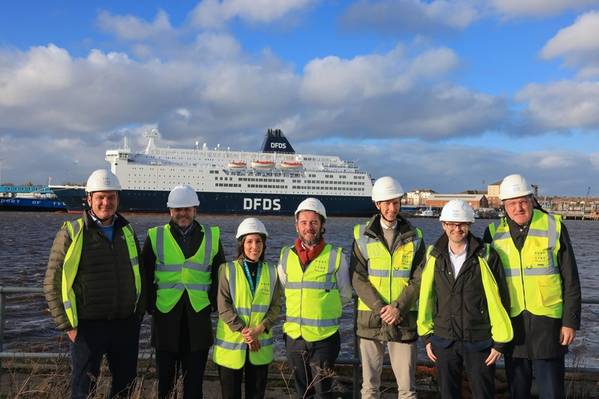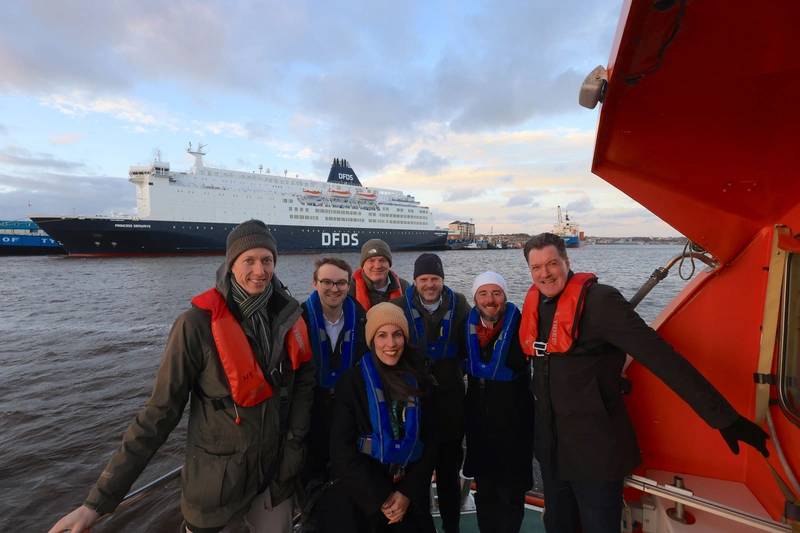
Partners from across the UK and Europe came together at the Port of Tyne recently late last month to officially launch the ‘Green North Sea Shipping Corridor Project’, which aims to create one of the world’s first green shipping corridors between the Port of Tyne and the Port of IJmuiden in Amsterdam.
The project is part of a £9million investment announced by Maritime Minister Mike Kane in October while at the Port of Tyne, to decarbonize shipping and turbocharge green jobs, from which the Port of Tyne was successful in winning the International Green Corridors Fund (CMDC5: IGCF).
During the partners visit, representatives from each organisation which includes the two ports as well as DFDS, Ricardo and KVSA, officially launched the project, helping to make smarter, cleaner shipping a reality.
The project aims to establish a Green Shipping Corridor (GSC) between the Ports of Tyne (UK) and IJmuiden (Netherlands), focusing on decarbonizing the route currently served by older vessels. It will determine the necessary landside infrastructure at the two ports for fueling and electrification, analyze the fuel supply chain and evaluate the economic and environmental benefits.
The partners already have a longstanding relationship, having connected the North East and the Netherlands via a popular DFDS ferry route for many years, which runs between the Port of Tyne’s International Passenger Terminal and the Port of IJmuiden. The ships currently on the route are mainly transporting passengers and their vehicles, as well as freight units and HGVs carrying vital goods and finished products to and from the continent.
Matt Beeton, CEO at the Port of Tyne, said: “By establishing this green corridor between the Port of Tyne and the Port of IJmuiden, we aim to significantly reduce carbon emissions between the North East of England and Europe, with the aim of saving up to 850,000 tonnes of CO2 annually. The success of this project will bring more green jobs to the region and drive the development of port infrastructure for electrification and the refuelling of state-of-the-art clean powered vessels.”
 Tim Scarbrough, Ricardo Matthew Moss, Ricardo Alexander Coesel, KVSA Florian Vreeburg, KVSA Declan Walsh, DFDS Peter van de Meerakker, Port of Ijmuiden, Eleni Bougioukou, Port of Tyne. Image courtesy Port of Tyne.
Tim Scarbrough, Ricardo Matthew Moss, Ricardo Alexander Coesel, KVSA Florian Vreeburg, KVSA Declan Walsh, DFDS Peter van de Meerakker, Port of Ijmuiden, Eleni Bougioukou, Port of Tyne. Image courtesy Port of Tyne.
Declan Walsh, Director Business Development and Strategy at DFDS, said "DFDS is committed to becoming a carbon neutral Transport & Logistics company by 2050 and the decarbonization of our Passenger business is a key part of this journey. Transforming our current Amsterdam-Newcastle route to a RoPAX Green Corridor is a massive undertaking and we are fortunate to have such great partners to help us make this happen".
Green corridors are zero emission maritime routes between two or more ports. As part of the £9million funding, a green shipping corridor between the Port of Holyhead and the Port of Dublin, as well as from the UK to Norway and Denmark will also be explored.



